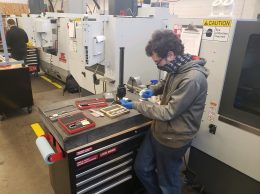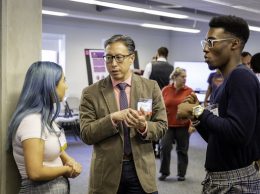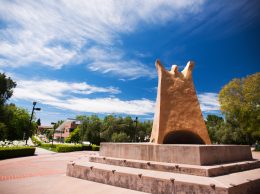Antioch University in downtown Santa Barbara is launching an MBA program that stands out from the rest by teaching students not only how to do business, but also how to do good.
With a class of 22 students and a start date of Sept. 5, the new 16-month program isn’t your everyday MBA degree. “It’s a particular kind of master’s in business administration that has a focus on social business, nonprofit management and strategic leadership,” said Nancy Leffert, president of the small liberal arts college.
Antioch has about 400 students, mostly in graduate programs in education and clinical psychology.
The new social-business MBA includes 36 units of online coursework, coupled with monthly weekend-long classes. Its curriculum includes the the usual MBA offerings — courses on finance and marketing, for example — but also touches on topics such as global philanthropy, social responsibility and international trade and economics.
“Particularly in this town, we have so many businesses that have led the way in terms of having an area of their business that is focused in some way on some social good,” Leffert said, mentioning companies such as Goleta-based Deckers Outdoor Corp., which was recently named a top employer by Outside Magazine and is widely known for its sustainable business practices.
Such companies make socially conscious decisions in multiple areas of their business, said Program Director Judy Bruton. “They’re businesses that have a consciousness about their footprint in the world and that care about how they treat their employees and that aren’t just looking at profits as the only measure of success,” she said.
The new program will feature adjunct professors including executives from businesses such as Deckers and Ventura-based outdoor gear and apparel maker Patagonia, as well as attorneys and finance experts.
There are roughly 2,500 nonprofits in the greater Santa Barbara area alone. The MBA will also be pivotal in producing future nonprofit leaders and workers who need the business skill set that’s usually only found in the for-profit world, Leffert said.
“What has been repeatedly reported to me by people leading other nonprofits is that people who tend to go into nonprofit work have a passion, but they may not be business-oriented, and yet, nonprofits are also businesses,” she said. “That’s why it seemed particularly important for us, in offering a business program, to do it in this way that is truly responsive to our community.”
In May, Santa Barbara played host to its first-ever startup contest for nonprofits, called Fast Pitch SB, with nonprofit leaders competing and learning business skills such as marketing techniques along the way.
“This is a very timely moment for us to be doing this,” Leffert said.
Antioch also hopes to educate the next generation of socially responsible businesspeople in the for-profit sector. “We’re intentionally trying to reach out in the community and find people who are interested in social change and are curious about exploring whether to make that change through a nonprofit or for-profit organizational structure,” Bruton said. “And [we want to] ask those people to come study together, recognizing all the commonalities that exist between those organizations.”
Online “discussion rooms” and multimedia content such as video guest lectures and interviews will drive the mostly virtual coursework, Bruton said. But hands-on coursework done through a special project class will be completed throughout the entire 16 months of the program. The practical nature of Antioch’s course structure sets it apart from MBA programs at other universities, where projects and real work experience usually take place in the last semester of the program, she said.
The program will host Friday night workshops once a month, where students and their advisers and adjunct professors come together to learn a new activity or listen to a lecture. These special events may eventually be opened up to the public, as the program later develops, Bruton said.






 Print
Print Email
Email

















